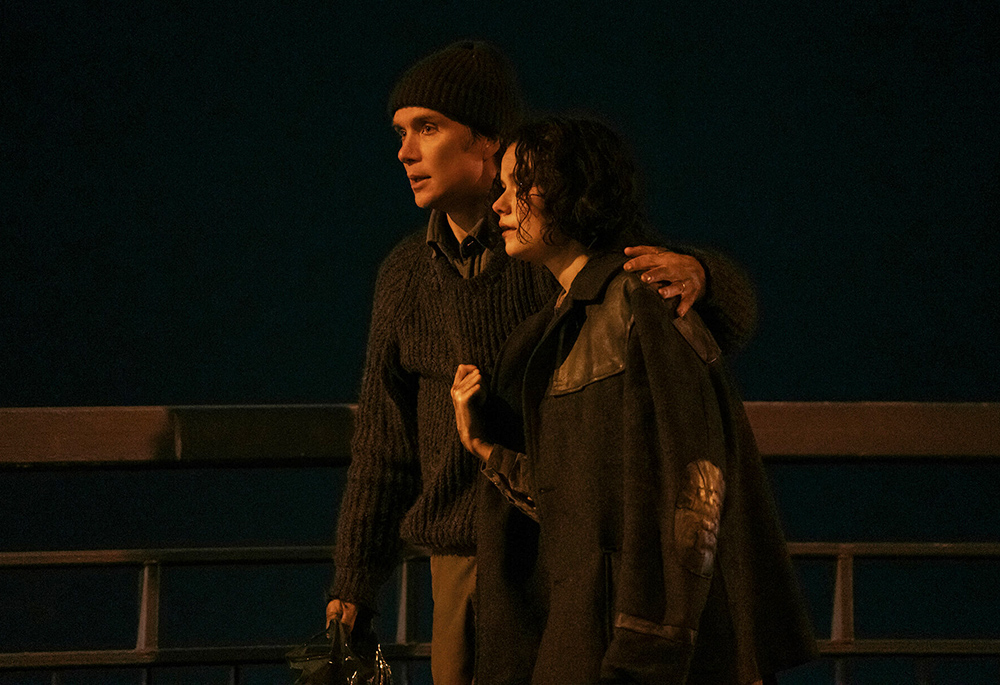
Cillian Murphy and Zara Devlin star in "Small Things Like These." Based on the 2021 novel by Claire Keegan, the film thrusts Murphy into moral peril when family, acquaintances and respected women religious advise him to disregard institutional abuses that he has witnessed. (Lionsgate)
Editor's note: The following article contains spoilers for "Small Things Like These."
An Irish-born coal vendor bedeviled by memories of a Dickensian childhood arrives at the local convent for a routine coal delivery. Bill Furlong has spent the last several nights nocturnal and restless, milling about the house, staring at streetlights and passersby. His five young daughters appear aloof to his troubles but Bill's wife, Eileen, has taken notice. He is silent; she is suspicious.
After dropping off the coal shipment, Bill enters the convent to deliver an invoice. He is greeted by the sound of muffled screams and soon discovers young girls, terrified and disheveled, scrubbing floors like indentured servants. One girl runs towards Bill and begs to be saved, but her plea is interrupted by a Catholic sister who chastises him for entering unannounced. Back at home (and more disturbed than ever), Bill confides in Eileen about what he witnessed.
"It's none of our business," she says. "If you want to get on in this life, there are things you have to ignore."
A moody, quiet storm of a film about secrets and those who keep them, "Small Things Like These," based on the 2021 novel by Claire Keegan, thrusts a riveting Cillian Murphy ("Oppenheimer," "Peaky Blinders") into moral peril when family, acquaintances and respected women religious advise him to disregard what he has witnessed.
The film, set in 1985, melds fact and fiction regarding an appalling period in Irish and Catholic history: the decades-long operation of asylums-cum-slave camps where orphaned girls, abused women, sex workers and unwed mothers were cut off from society and forced to labor under prison-like, sometimes fatal, conditions.
After Eileen instructs him to forget his experience at the convent, Bill returns with a flashlight and finds an adolescent girl, Sarah, cowered in the corner of a locked shed. Through tears, she tells him her baby has been abducted. Naively, perhaps, he brings Sarah back to the convent, where the fearsome mother superior (a stern Emily Watson) attempts to buy his silence with an envelope stuffed with cash. Polite to a fault, he takes the money ("Yes, mother"), but tells Sarah to come find him later.
Murphy portrays Bill as a man teetering on the edge of crisis, trapped between the wounds of the past and the horrors of the present. He has no allies in this fight: A friend directs him to remain quiet about Sarah because "making a nuisance" could jeopardize his daughters' education at the convent school. "These nuns have a finger in every pie, Bill," she says. Taking matters into his own hands, Bill rescues a weakened Sarah from the convent and brings her home, uncertain what lies ahead.
At Ireland's Magdalene laundries, a sprawling constellation of ramshackle institutions governed by Catholic nuns between 1922 and 1996, more than 10,000 women — many sent to the laundries by government officials — were "enslaved" under dismal conditions, as per a state report that collected data from 10 laundries. At its conclusion, the film cites an investigation into 18 "mother and baby" homes that confined "56,000 unmarried mothers and about 57,000 children" during that same period. Girls as young as 9 and impoverished women impregnated by rape worked without pay or benefits for years while suffering brutish treatment under inhumane circumstances.
Advertisement
"They were called 'Magdalenes' or 'penitents,' " reported "60 Minutes" in 1999. "They were supposed to wash away their sins along with the stains on the laundry of the orphanages and churches, prisons, even the local butcher shop."
And then there were the deaths. In 1993, when the Sisters of Our Lady of Charity sold their north Dublin property for a hefty sum, the bodies of 133 women were found discarded in unmarked graves, prompting nationwide outrage and bringing renewed attention to abuses at the laundries. (An additional 22 bodies were later discovered at that same site.) The 2021 report on "mother and baby" homes delivered another sobering revelation: Some 9,000 children died in these institutions. Enda Kenny, the former prime minister of Ireland, offered a formal apology for the laundries in 2013.
"We put away these women because for too many years we put away our conscience," he said in a parliamentary address.
But Bill Furlong is unable to put away his conscience, despite the warnings of others and threats of consequences. His moral sense provokes him into action. The film is not a history of the laundries, but a portrayal of one good deed that makes a difference, a "small thing" that carries extraordinary power and demands that all Catholics ask how we might do likewise.







